The Managed Illusion of Choice

Tetleys TLDR: The Summary
The current Labour Government is barely distinguishable from the last Tory one. Across every major policy area: economy, NHS, housing, civil liberties, immigration, foreign policy, workers’ rights, and democratic reform, Labour continues Tory-era policies. They’ve ditched radical change in favour of status quo management: no wealth tax, no NHS renationalisation, no rent controls, no serious migrant justice, no bold union support, no democratic overhaul and they back Israel and arms sales just like the Tories before them. Style has replaced substance, and Labour’s leadership is packed with the same elite, corporate-friendly careerists they once opposed.
TetleysTLDR: The article
I started writing this on Thursday. After posting the Starmer meme below stating 'Meet the new Boss…' I ended up in a debate yesterday with someone I deeply respect. He is intelligent, articulate, genuinely driven by causes that matter, the kind of person you’d hope would see through the façade. And yet, somehow, he can’t or won’t. He still believes in this Labour government. Still defends it. Still tells himself, and me, that things are better now, that we’ve ‘turned a corner’. And I get it. After everything we’ve lived through, people want to believe. They want this to be the light at the end of the tunnel.
But I can’t share that illusion. Not when the evidence is stacked this high. I was told that saying Labour and the Tories are the same is 'bonkers'. I don’t suppose this article will change his mind but it did get me thinking.
You might think it's lazy to say Labour are just 'just the same' as the Tories. Of course, they do have differences if you’re measurement is by party manifestos or listening to the pantomime in Parliament. Labour will point to different spending priorities, different slogans, different moods. The Tories were brutish, Labour are managerial. The Tories shouted about 'woke' nonsense, Labour prefer quiet nods to 'competence'. But all that is just veneer if the systemic operation of Parliament doesn’t change. Behind the curated optics, behind the parliamentary theatre, lies a more uncomfortable truth: what’s toxic in British politics isn’t just policy, it’s the shared modus operandi.
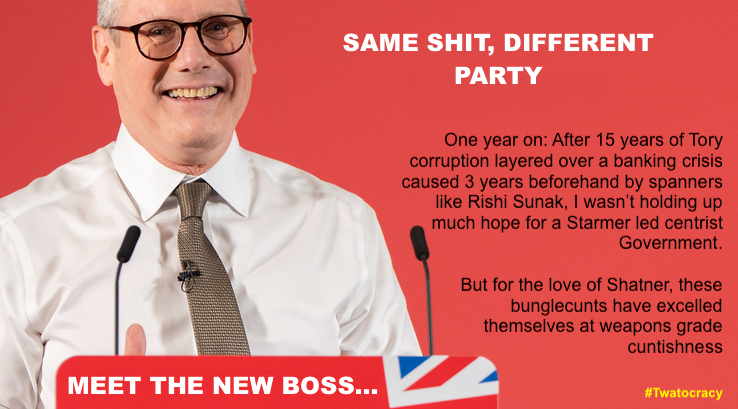
The Labour Government has inherited not just the reins of power, but the same cynical, transactional, top-down style of rule that defined the Conservative decade before it. And that is the real rot.
Labour are unpopular. Naturally at the media coalface as they always are, but also at grass roots. Starmer said if you don’t like the way he’s running the Party then leave, and people did. So many that they’ve stopped publishing membership numbers. The fact is most people don’t feel any meaningful shift since the election. Yes, the faces on the news have changed, but the foundations and the broken systems, the hollowed-out institutions, the sense of popular powerlessness remain steadfastly intact.
Why? because neither party is interested in overhauling the system that got them there in the first place. Instead, Labour has chosen to mimic the very machine the Tories built: centralised power, media triangulation, donor-driven decision-making, and an allergy to anything resembling grassroots democracy. That’s the continuity that matters and that is why it really is meet the new boss, same as the old boss.
Labour v Tory: Then and now
There is a big elephant in the room. And it is sickening to anyone who truly believes in democracy. Those who wanted change were never going to see real change under someone who is so embedded into the status quo as Starmer is. The truth is for a long time there's not been a huge difference in Government between Labour and the Tories. Now there is even less. It is the managed illusion of choice in a democracy in managed decline. The last time there was genuine clear blue water between the Tories and Labour was in the time of Wilson and Heath. The real ideological chasm, where you could look at the two main parties and genuinely see fundamentally different visions of Britain hasn’t existed for decades. Harold Wilson’s Labour was still rooted in the post-war consensus: strong unions, public ownership, building social housing, and an active state role in the economy. Even Edward Heath, a Tory, accepted much of that consensus, albeit reluctantly, until the oil crisis and industrial strife pushed him rightward. Since Thatcher, however, the Overton window shifted so far to the right that both parties now operate within essentially the same neoliberal framework. Blair’s New Labour didn’t reverse Thatcherism, it cemented it. The differences since then have been more about tone, presentation, and which set of corporate donors get their policy wish-list ticked off, rather than any meaningful shift in economic philosophy. Wilson v Heath was an argument about how society should be structured. The sad thing for British democracy was Sunak vs. Starmer was an argument about who gets to wear the Prime Minister’s suit while keeping the same structures in place. This table compares the policy positions of Labour and the Tories in the 1970s, during the Wilson–Heath era, with those of the 2020s under Starmer and Sunak. It shows how the ideological gap between the two parties has narrowed dramatically over the decades.
| Policy Area | 1970s Labour (Wilson) | 1970s Tories (Heath) | 2020s Labour (Starmer) | 2020s Tories (Sunak) |
| Economic Model | Keynesian economics, active state intervention, industrial strategy | Keynesian but more cautious, some market-led reforms | Neoliberal, pro-market, accepts austerity constraints | Neoliberal, pro-market, pushes austerity |
| Public Ownership | Nationalised industries central to policy | Retained most nationalised industries until late Heath years | No renationalisation of utilities or rail | No renationalisation, privatisation encouraged |
| Trade Unions | Strong support, legal protections, collective bargaining central to wage policy | Accepted unions but sought moderate curbs during disputes | Accepts anti-union laws from Thatcher era, no repeal plans | Maintains anti-union laws, pushes further restrictions |
| Housing | Large-scale council house building, rent controls | Built social housing but began tentative rent deregulation | No major social housing programme, backs “help to buy” over rent controls | No major social housing programme, fully backs market-led housing |
| Foreign Policy | Generally non-aligned leaning, some distance from US, pro-Commonwealth | Pro-US, pro-NATO, but willing to join EEC | Pro-US, pro-NATO, strong support for military interventions | Pro-US, pro-NATO, strong support for military interventions |
| Welfare | Expanding welfare state, higher benefits | Maintained welfare but with tighter eligibility | Maintains Universal Credit framework, minimal increases | Maintains Universal Credit, pushes conditionality |
| Tax | Progressive taxation, higher top rate | Progressive but slightly lower rates than Labour | Keeps low corporation tax, cautious about taxing the wealthy | Keeps low corporation tax, cuts for business where possible |
| Philosophy | Social democracy, equality through redistribution | One-nation conservatism with market leanings | Managerial centrism, “fiscal responsibility” within neoliberalism | Market liberalism with nationalist rhetoric |
Bottom line:
- 1970s: Both parties shared a broad social-democratic consensus but Labour tilted hard towards redistribution and public ownership, while the Tories were slower to embrace markets.
- 2020s: Both operate in the same neoliberal framework. The disagreements are mostly about how to manage it, not whether it’s the right model.

And look at austerity, a Tory policy if ever there was one. Chancellor Rachel Reeves has been telegraphing for months that it's coming back.
Her “iron discipline” talk isn’t code for raising taxes on the wealthy or clawing back windfall profits from corporations. It’s code for balancing the books on the backs of ordinary people while keeping the rich and big business comfortable. We’re likely to see:
- Council tax hikes and stealth taxes that hit low and middle income households far harder than the wealthy.
- Service cuts dressed up as 'efficiency savings', meaning closures, longer waits, and more outsourcing.
- A refusal to touch wealth taxes, mansion taxes, or serious corporation tax rises, because Reeves has promised the City of London and corporate lobbyists there’ll be 'no surprises'.
It’s austerity 2.0, but in a red dress suit instead of a Tory blue one. And just like Osborne’s original austerity, it will almost certainly depress growth, weaken public services, and deepen inequality, all while being sold as responsible economic management.
Labour is already bleeding goodwill barely into its term, and it’s no mystery why. After riding in on a tide of anti-Tory sentiment, Starmer’s lot have governed with all the imagination of a local bank manager reading out loan conditions. There’s no transformative vision, just endless talk of 'fiscal responsibility' while living costs spiral and public services rot. For voters who wanted change, getting Rachel Reeves’ accountancy-led austerity feels like being served cold tea in a chipped mug after a decade of Tory swill, marginally different, but still undrinkable. Even dyed-in-the-wool Labour supporters are starting to mutter that they didn’t turf out the Conservatives just to be handed Conservatives in red ties, and Starmer’s tin-eared refusal to break from the neoliberal script is already sowing the seeds of another lost generation of trust.
What about the 14 years of tory mismanagement? Well, blaming the 'mess we’ve inherited' is the oldest trick in the Westminster playbook, and Labour are milking it for all it’s worth, but it’s no excuse. Yes, the Tories left the economy battered, public services hollowed out, and trust in politics at rock bottom, but Labour knew exactly what they were walking into, and they campaigned on the promise they could fix it. If you take the job knowing the house is on fire, you don’t get to spend your first year telling everyone it’s too hot to work; you start putting the flames out. Instead, Starmer and Reeves are using the rubble as cover in order to stick with austerity economics, refusing to tax the wealthy, and keeping the privatisation gravy train running. That’s not about 'inheritance' that’s about political choice.
And people are sick to the back teeth of it, and not just the left. On the right, voters who once backed the Tories in despair at Labour’s drift are now muttering that Starmer’s government feels like a change of tie rather than a change of course. On the left, those who hoped for a break from neoliberal dogma see the same old austerity logic dressed up in 'tough choices' soundbites. Across the spectrum, there’s a shared exhaustion with governments that talk up 'responsibility' while delivering more of the same managed decline, squeezing the middle and working classes while the rich sail on untouched. When both sides of the political divide are bored rigid and angry in equal measure, it’s not 'centrism', it’s political dead air. And this dead air is the contained atmosphere of Westminster that they all breathe.
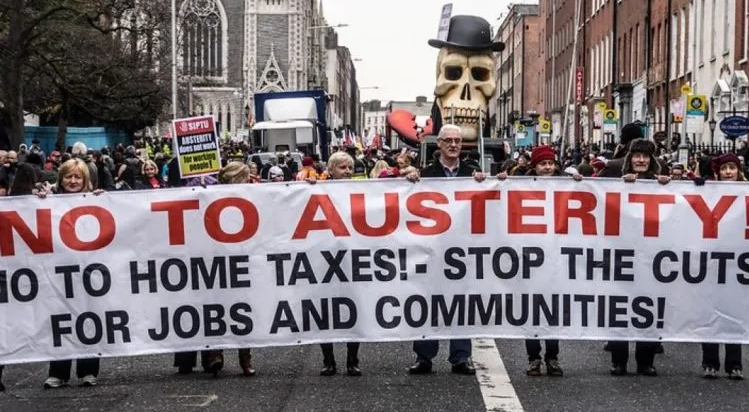
Key drivers of Labour’s unpopularity
1. Economic Strain and Fiscal Pain
Labour’s ambitious tax measures, including £40 billion in tax rises, increased National Insurance contributions for employers, and tighter farm inheritance tax thresholds, have been viewed as harmful to ordinary workers, small businesses, and the rural economy. The Times+15The Sun+15The Guardian+15Wikipedia+1 These measures come alongside welfare cuts, especially reductions to winter fuel allowances and personal independence payments, fuelling a sense that the government has abandoned its traditional base. The Guardian+1.
2. Political missteps and mixed messaging
The government had to backtrack on welfare reforms when internal dissent erupted, Labour MPs numbering around 200 opposing planned cuts. The Guardian+1 Communication missteps such as Starmer’s ‘nimbys’ remark offending rural voters have contributed to escalating frustrations. The Guardian+11The Times+11Sky News+11
3. Hypocrisy, cronyism & controversies
Starmer and key figures came under fire for accepting over £100,000 worth of gifts and hospitality, triggering accusations of hypocrisy given the government’s austerity messaging. Reddit+15Wikipedia+15Wikipedia+15 The resignation of Homelessness Minister Rushanara Ali following tenant eviction and rental hikes added credibility to critics portraying Labour as out-of-touch and self-serving. Financial Times+1
4. Plummeting popularity
Starmer owns one of the steepest falls in approval. His net favourability bottomed at –46 in May, before inching back to –34 in June still deeply negative. YouGov+3YouGov+3YouGov+3 As of today, satisfaction with Labour’s performance is extremely low at just 21%, with growing competitors like Reform UK capitalising on public disillusionment. The Times+2YouGov+2
5. Fragmented Left and Rising Populism
The populist right, notably Nigel Farage’s Reform UK, has made substantial gains by focusing on immigration, crime, and housing: framing Labour as ineffectual. The Times+15Financial Times+15The Economist+15 On the left, dissent is growing. Former left-wing MPs, including Zarah Sultana, are defecting to new parties, a sign of erosion in Labour’s internal unity. Wikipedia+1
6. Voter sentiment: 'where’s the change?'
Many traditional Labour supporters express disappointment over the absence of bold vision, feeling the party has veered too close to Conservative policies. The Guardian+1 Chancellor Rachel Reeves has candidly admitted ithis month that Labour ‘does not deserve’ to win the next election unless it delivers real change. That change does not appear to be forthcoming The Guardian
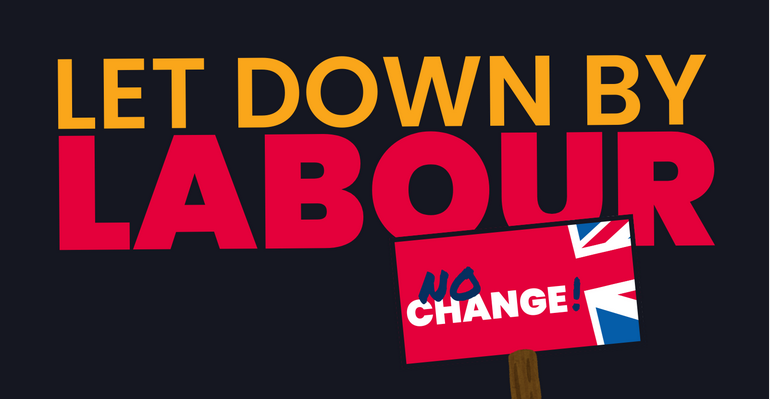
Economic Continuity: Neoliberalism with a human face
Labour insists it won’t ‘crash the economy’, a euphemism for refusing to tax the wealthy, refusing to spend boldly, and refusing to challenge a decades-old consensus that treats public services as liabilities rather than lifelines. Like the Tories, Labour champions ‘fiscal responsibility’ which in practice means starving services while letting corporate profits balloon. The rich remain untouched, and the poor are told to wait. Again.
Private sector involvement in everything from healthcare to education remains the default. PFI logic, outsourcing logic, ‘public-private partnerships’: all Trojan Horses for backdoor privatisation continue under new management. Labour won’t nationalise energy or water, and it has quietly dropped any serious plan to challenge the financial elite. The faces change. The game doesn’t.
NHS: Outsourced and overstretched
Under the Tories, the NHS was brutalised, through underfunding, staff demoralisation, and creeping privatisation. Labour promised to be its saviour. But the reality? The private firms are still here. Virgin Care, Palantir, Operose, Nuffield, Babylon Health, none of them are packing their bags. Labour's health team talks about ‘using capacity in the independent sector’ which is code for outsourcing more treatments to profit-driven providers. The ideology hasn’t shifted. It's still market-first, patient-second.
Housing: Same landlords, same scandals
Housing policy is where the overlap becomes grotesque. The Tories turned housing into an investment scheme for the already wealthy. Labour, despite the rhetoric, refuses rent controls, won’t abolish Right to Buy, and continues to elevate landlords to positions of power including up until this week, Rushanara Ali, as a Homelessness Minister.
(covered in blog yesterday A plague on all your houses)
Let that sink in: the person tasked with solving Britain’s housing crisis was a landlord who has evicted her tenants so she could hike up her rents. What incentive does someone like that have to fix the system? None. Because whether red or blue, Westminster serves the asset class, not the homeless.
Authoritarianism: policing protest, silencing dissent
Labour voted for and now enforces many of the authoritarian laws the Tories used to criminalise protest and expand police powers. Instead of repealing the Public Order Act or the Police, Crime, Sentencing and Courts Act, Labour has kept them in place. This is not an accident. It’s a design. The same disdain for protest, the same paranoia about ‘extremism’, the same love of cameras, data-harvesting and policing power, it’s all intact. In fact, under Labour, peaceful campaigners like Palestine Action have now been proscribed : a chilling escalation of state repression. Whether it's Extinction Rebellion or pro-Palestine marches, the playbook remains the same: control, contain, criminalise.
Immigration: hostile by design
The Tories made life hell for migrants. From the Windrush scandal to the Rwanda scheme, their record was an international disgrace. Labour, to its shame, has not offered any true reversal. The hostile environment policies remain largely untouched. Immigration detention continues. The victim blaming continues. Labour has refused to expand safe routes for asylum seekers or to dismantle the legal architecture that made Britain a hostile place to call home. They’re not quite using the same language but they’re using the same laws. And the one in one out policy with France makes absolutely no sense.
Foreign Policy: blood on both hands
The horrors unfolding in Gaza have exposed another shared sickness: unflinching support for a war criminal ally. The Tories armed Israel. Labour has refused to stop. Even in the face of ICJ rulings, UN condemnations, and mass public outcry, Labour has stood firm with the oppressors, not the oppressed. Lammy keeps saying with a straight face that he’s stopped weapons sales to Israel but, and there is no sugar-coating this, it is a lie. It is a betrayal dressed as ‘pragmatism’. But the logic is familiar: British foreign policy, regardless of party, protects profit, empire, and arms deals. Human rights are a footnote.
Workers’ rights: promises broken, Unions frozen out
Labour once promised to repeal the Tories’ anti-union laws. That promise is gone. In its place, we have vague commitments and reheated Blairite rhetoric about ‘hard-working families’ as if striking workers weren’t. The Tory war on unions was loud and proud. Labour’s is quieter, a war by omission. By refusing to empower collective bargaining, refusing to strengthen union protections, and freezing out union voices from serious decision-making, Labour is continuing the same Thatcherite war on worker power. When Streeting threatens the BMA, this tells you all you need to know.
Democracy: The same broken tools
The House of Lords remains. First-past-the-post remains. Corporate lobbying remains. Labour has no plan to fundamentally reform the broken structures of British democracy because they now benefit from them. The very same centralised, anti-participatory, lobbyist-infested machine that the Tories used to rule will now serve Labour. Power doesn’t devolve. It calcifies.
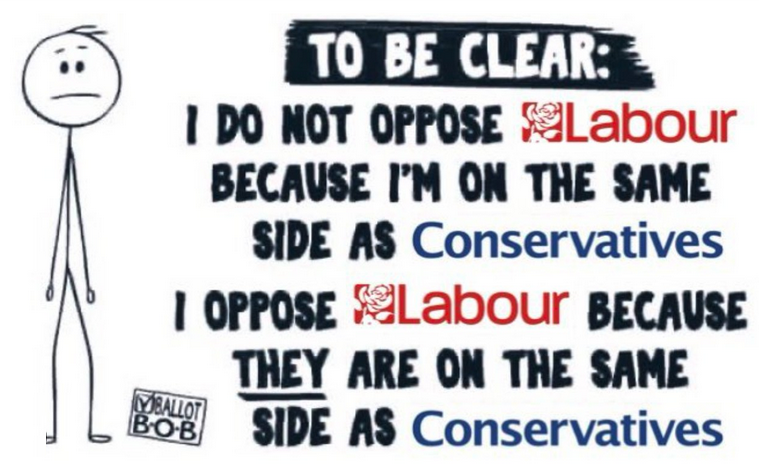
This is what 'Change' looks like?
Labour will say ‘the grown-ups are back in charge’. But if this is adulthood, it’s joyless, cynical and void of ambition. The Tories wrecked Britain. But Labour offers no rebuild, only a repainted version of the same rigged game. This is not about party colours or slogans. It’s about who this system serves and who it punishes. And that, under Labour is exactly the same as it was under the Tories.
The real poison in British politics is not one party or another, it’s a shared mode of governance that treats the public as passive spectators, corporations as stakeholders, and resistance as a threat. Labour and the Tories may differ in tone, but their methods: centralised control, PR-driven policymaking, subservience to capital, contempt for grassroots mobilisation are absolutely indistinguishable.
And for the people who this revelation hits like a brick in the face, I get that. After 14 years of Tory mismanagement, 14 years of cuts, chaos, cruelty and cronyism, people were desperate for change. Real change. A government that would stop punching down. A government that would prioritise the many over the few. A clean break with some clear red water between what had been and what could be. And that's the lie we were sold. That's the illusion people clung to, and in some cases are still clinging to. The idea that Starmer's Labour represented a reset. A chance to rebuild what was broken. A different way of doing things.
But let’s be honest: that clear red water turned out to be barely a damp purple trickle. What we’re witnessing instead is a kind of political Stockholm Syndrome. People who want to believe. Who need to believe that this is the better option, not just electorally, but morally. That Starmer is somehow biding his time, playing the long game, peeling back the layers of Conservative rot before springing some grand progressive plan. But after a year in office it is clear this will never happen. There is jam tomorrow - no grand plan. There’s just triangulation, capitulation, and the slow, steady betrayal of the very principles Labour was founded to protect.
And yet still, there are some who still persist in belief in the Starmer plan. Clinging to this fantasy that Starmer is ‘doing what he has to do’: as though cosying up to property developers, landlords, and arms dealers is a noble sacrifice. As though silence on Gaza, purging the left, praising Thatcherite policies, or throwing climate promises in the bin is just clever political strategy. They pretend he's playing chess while the rest of us are screaming at a man kicking his own pawns off the board.
Every action his government has taken since coming to power, and many taken long before, has failed every basic moral test. Whether it's Palestine, NHS privatisation, workers’ rights, housing, or civil liberties. The Starmer project is not some imperfect version of progress. It's regression in a smarter suit. It's Blairism without the charm. Neoliberalism with better PR. And the worst part? The people who are still trying to defend it. The centrist apologists who perform outrage at Tory cruelty but shrug when Labour does the same in a lower tone of voice. Who told us to hold our noses and vote Labour to get the Tories out, then offer no resistance when the same policies roll on, just under a red banner instead of a blue one. And recognising that is not ‘bonkers’.
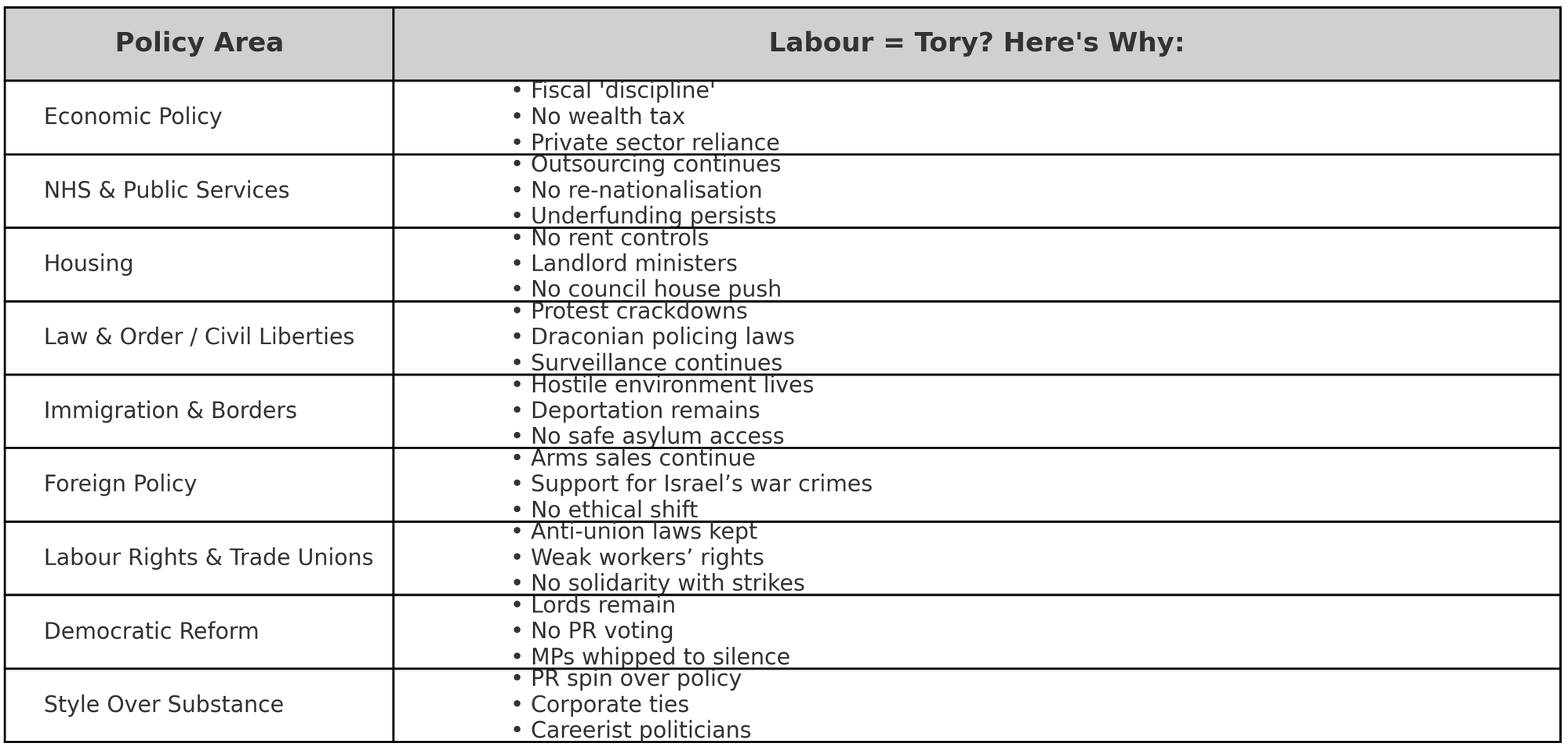
This isn’t tactical compromise. It’s capitulation dressed up as competence. We were told to be grown-ups, to accept the realpolitik of the moment. But grown-ups should be able to call bullshit when they see it. And what we're seeing now is not ‘better than the Tories’: it’s their legacy being managed, maintained, and protected by people who claimed they’d tear it down. So no, I don’t buy it. I won’t pretend that Starmer's Labour is something it’s not. And I won’t stay quiet while others pretend they can’t see what’s in front of them. If you need Starmer to be different, then make him be different, hold him to account, drag him left, don’t cover for him as he drifts ever further right. Because if you’re still telling yourself he’s the answer, boy have you you’ve misunderstood the question.
Take Easington in County Durham, a former pit village next to the North Sea. A place where you can buy an inhabitable house for £15,000. A place deep in the former industrial heartland and a place that was Labour to its bones. At the latest by-election this week, it went to Reform with a 49% vote.
Let that sink in. A place forged in working-class solidarity, crushed by Thatcher, abandoned by Blair, and now sold out by Starmer, has turned to the far right. And yet you still have to ask: why are these villages falling to Reform? Why are communities that once stood shoulder-to-shoulder for Labour now turning their backs? It’s because when both main parties are two cheeks of the same arse, reading from the same neoliberal playbook and with nothing to offer to the people they want their vote from, when Labour parrots Tory lines on immigration, law and order and economic ‘credibility’ people stop listening. And when no one’s speaking for them, or giving them answers, politics abhors a vacuum. People will listen to anyone who comes along with solutions, even if those solutions are snake oil. Even if it is the far right. Even if it is the racists. Even the grifters. Even the ones who would see them worse off. To enable that is not just a failure of Labour strategy, it’s a moral failure. It’s shameful and it’s happening in broad daylight right now.
Yes, Labour is doing some good things, a cautious policy here, a worthy promise there: but this isn’t a question of change happening too slowly. It’s that real change hasn’t even been factored into the plan. We’re not watching a work-in-progress. We’re watching a performance.
Labour’s wearing a new shirt, sure. Crisp, centrist, PR-friendly. But underneath? It’s still the same rotting corpse of triangulation, careerism, landlord politics and fealty to the markets. The same machine that watched austerity gut the country and nodded along. The same machine that purged its own soul for a sniff of power. You can’t just rebrand rot. You have to cut it out.
Labour is never going to be a democratic socialist party again. But it needs to have its place in the political spectrum, something it stands for: not some vanilla Mandelson phantom flip flopping around the political spectrum. Proscribing peaceful protesters and enabling the far right is hardly a legacy is it?
Until Labour distances itself from the Tories, until it rejects the structural operations that make it the same as the Tories. Until it scraps that model entirely and starts being a fucking Labour Party again, no election will bring liberation. Just different hands on the same rotting steering wheel.
I appreciate this all sounds depressing... and it is. Watching a government you expected more of morph into the very thing you wanted rid of is a special kind of political gut-punch. It’s the slow dawning realisation that the promises were just mood music, that the 'change' was cosmetic, and that the machine grinds on regardless of which colour rosette is pinned to it. People cling to hope because the alternative is bleak, but hope without delivery curdles into cynicism, and Britain has had more than its fill of that. The truth is, unless there’s a real break from the current script, we’re set for another grim half-decade of drift, just with a different logo on the letterhead, or worse a Reform Government that will guide us towards fascism.
FOOTNOTE
Just to reinforce the allegation that Labour and the Tories are the same. Here’s a list of commonalities between the current Labour Government and the last Tory Government, broken down by policy area and approach, showing just how blurred the lines have become:
Economic Policy
- Commitment to fiscal responsibility: Both governments worship at the altar of balanced budgets and debt reduction over investment in public services.
- No wealth tax / no major tax reform: Neither government is willing to touch wealth, land, or windfall taxes to address inequality.
- Support for private sector involvement: Both push outsourcing, PFI-style partnerships, and private delivery of public services.
NHS and Public Services
- Privatisation by stealth: Continued outsourcing of NHS services to private firms under both governments.
- No plan for re-nationalisation: Labour has abandoned any pledge to bring services back in-house.
- Funding pressures remain: Both continue to starve the NHS and local authorities of real-terms funding increases. Any claimed investments by the Government are really repurposing existing budgets.
Housing
- No rent controls: Both refuse to introduce rent caps despite the spiralling private rental crisis.
- Landlord-friendly policies: Labour’s housing ministers are landlords themselves, echoing Tory hypocrisy.
- Refusal to build mass council housing: No ambitious plan to reverse Right to Buy or restore public housing stock.
Law and Order / Civil Liberties
- Crackdown on protest: Both back authoritarian laws criminalising dissent and direct action.
- Expansion of police powers: Labour voted for and now enforces many of the draconian public order laws the Tories introduced.
- Continued use of Prevent and surveillance measures: Both support heavy-handed counter-terror frameworks that disproportionately target minorities
Immigration and Borders
- Hostile environment remains: Labour has not dismantled the anti-migrant policies embedded by the Tories.
- Support for deportations and detention: Labour has refused to commit to ending immigration detention or charter flights.
- Opposition to safe routes / asylum access: No meaningful reform proposed to make the asylum system humane or fair.
Foreign Policy
- Support for Israel’s war on Gaza: Labour backed the same pro-Israel line and refused to call for an arms embargo even after clear evidence of war crimes.
- No ethical foreign policy: Arms sales to repressive regimes continue, with no significant shift in approach.
Labour Rights and Trade Unions
- No repeal of anti-union laws: Labour has broken its promises and now retains Tory anti-strike legislation.
- Minimal support for striking workers: Labour has distanced itself from industrial action, echoing Tory rhetoric on ‘disruption’
- No bold agenda for workers’ rights: Watered-down pledges that stop far short of restoring collective power to workers
Democratic Reform
- No House of Lords abolition: Labour has abandoned plans to reform unelected political institutions.
- No proportional representation: Despite grassroots demand, Labour has kept the first-past-the-post system just like the Tories.
- MPs voting against conscience: Both parties use whipping and discipline to stifle genuine political plurality.
Style Over Substance
- PR spin over radical policy: Labour, like the Tories, relies on messaging, slogans, and media management rather than transformative vision.
- Corporate schmoozing: Shadow ministers-turned-ministers wine and dine with hedge funds, lobbyists, and oil firms, with a revolving door from 55 Tufton Street. No different from Tory donors' dinners.
- Careerist politics: Labour's front bench is full of SPADs, Israeli funded, Oxbridge careerists, and property speculators, just like the Tories.
A bit of shameless self-plugging here. This is www.TetleysTLDR.com blog. It's not monetised. Please feel free to go and look at the previous blogs on the website and if you like them, please feel free to share them.

